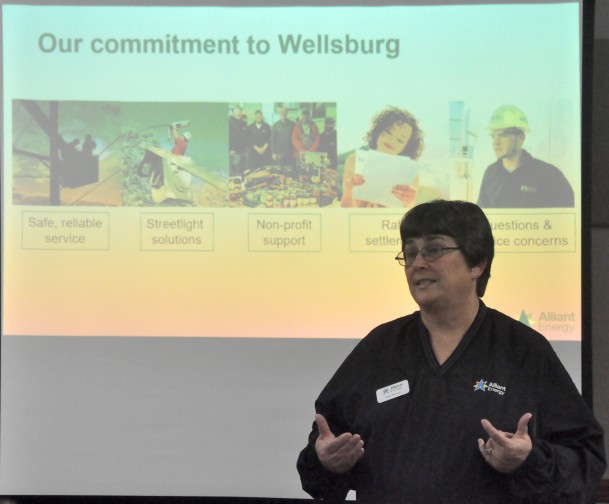Sparks fly at Alliant meeting in Wellsburg

Dee Brown (pictured) of Alliant Energy gave a presentation and laid out the company’s case for remaining the city of Wellsburg’s gas and electric provider during a meeting at the community building on Wednesday night. (Robert Maharry/Mid-America Publishing photo)
WELLSBURG- On the heels of a pivotal vote that could shape the future of energy ownership in Wellsburg, representatives for Alliant and citizens on both sides of the argument engaged in a passionate discussion at a community meeting on Wednesday night.
Dee Brown, the company representative who led the event, painted a ‘Yes’ vote to authorize the creation of a municipal gas and electric utility as a risky gamble that would likely end up costing residents far more than staying with Alliant—an investor-owned utility with headquarters in Madison, Wisconsin, and Cedar Rapids—in the long run. She also criticized the city council for moving forward to put the item on the ballot without first conducting a feasibility study.
“What are you voting on next Tuesday?” she asked. “You are giving the city full authority to move forward and municipalize gas and electric without ever coming back to you. I’m not saying they won’t, but they don’t have to.”
Some of the strongest opposition throughout the night came from past and present Wellsburg officials like city clerk Wendy Lage, former Mayor Cami Nederhoff, current Mayor Pat Kennedy, city council candidate JR Kennedy and former fire chief Mark Wiltfang, who repeatedly pushed back against Brown’s claims and argued that a ‘Yes’ vote would simply allow the council to consider other energy options before the Alliant franchise agreement expires in 2031.
Lage shared the story of a single mother who came into her office asking whether she should buy food or pay her electric bill, and another woman told Brown that her energy expenses cost her more on a monthly basis than her mortgage despite her conservative usage. Mayor Kennedy noted that several neighboring communities—Aplington, Dike and Grundy Center, to name a few—have transitioned to municipal ownership of their utilities and seen lower customer rates as a result.
“As mayor of the town, I can guarantee you we won’t do anything that will jeopardize this town in any way,” he said. “We just want the opportunity to explore possibilities. That’s all.”
Several attendees pressed Brown and other Alliant officials in the audience about whether the company is re-investing in Wellsburg, how much money the company is making off of the town and why the city’s light poles are in such poor shape. She responded that Alliant has spent over $2 million within the city limits of Wellsburg and works to promote economic development in rural communities that it serves around the state. She later told a questioner that the return on investment was around 9.5 percent, and although she couldn’t provide numbers on profits, online data estimate that Alliant’s gross profits have increased from $2.272 billion in fiscal year 2016 to $2.517 billion in FY 2019.
One resident questioned the necessity of replacing the Main Street lights considering the scarcity of downtown businesses, which drew a passionate rebuke from Steve Hippen, an outgoing councilman and new leader of the city’s economic development committee.
“You’re right, we don’t have many. But our goal is to get some here,” he said. “We got a (community visioning) grant, and we got interest. So don’t write the city of Wellsburg off the map, and I hope Alliant Energy doesn’t either.”
Nederhoff took the company to task for the condition of the light poles, calling them a “safety hazard” and wondering aloud whether Alliant was truly committed to rural development.
“You say you want to invest in small town Iowa, but from where I’m sitting, all of your money is going to big town Iowa,” she said.
Rate increases are another major point of contention in the debate, as initial reports indicated that Alliant planned to raise them by as much as 25 percent to fund investments in renewable energy. At the meeting, however, Brown told attendees that between 2018 and 2021, rates would actually only increase by a net of about 0.4 percent in Wellsburg.
Tim Whipple, the general counsel for the Iowa Association of Municipal Utilities (IAMU) explained the process of changing energy providers and the role the board plays in setting rates for consumers. According to Brown, the last five cities that have attempted to municipalize have been rejected by the Iowa Utilities Board, and she added that a feasibility study alone in Kalona cost taxpayers over $200,000.
Despite the criticism leveled at Alliant, several residents backed the company and framed any plan to move toward a municipal utility as misguided, with one even calling it “a choice between capitalism and socialism.” People’s Savings Bank President and CEO Eric Olson bemoaned finding out about the referendum “five days ago,” and Brown did not offer a clear answer on whether or not the company would potentially sue the city and seek to invalidate the results due to its failure to provide 60 days notice of the vote.
The ballot measure will be decided on Tuesday, and, as previously noted, a change would likely not be fully implemented until at least 2031, when the current franchise agreement expires. The polls will be open from 7:00 a.m. to 8:00 p.m. at the Wellsburg Public Library.
Category:
The Grundy Register
601 G. Avenue - P.O. Box 245
Grundy Center, IA 50638
Telephone: 1-319-824-6958
Fax: 1-800-340-0805
Mid-America Publishing
This newspaper is part of the Mid-America Publishing Family. Please visit www.midampublishing.com for more information.
